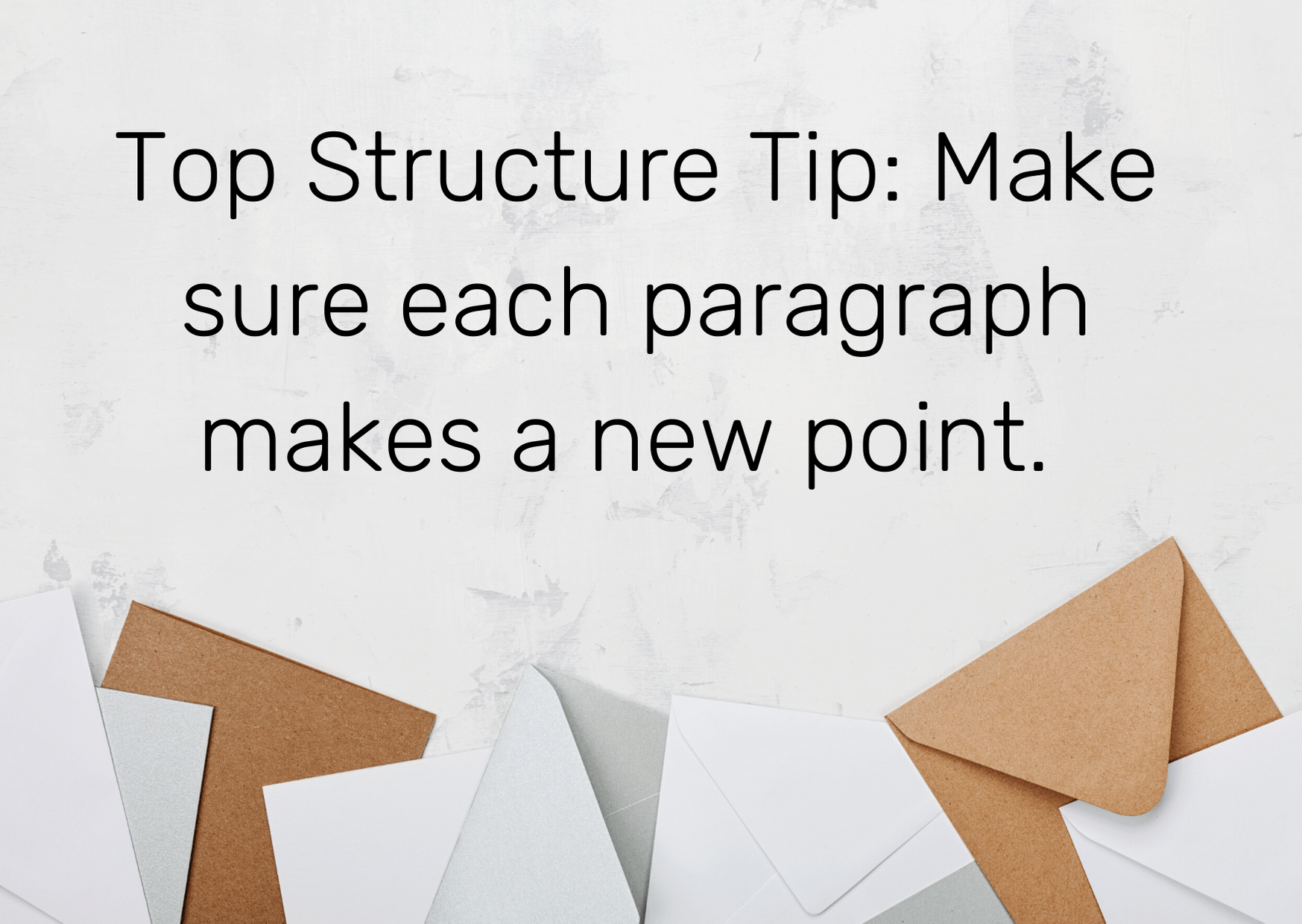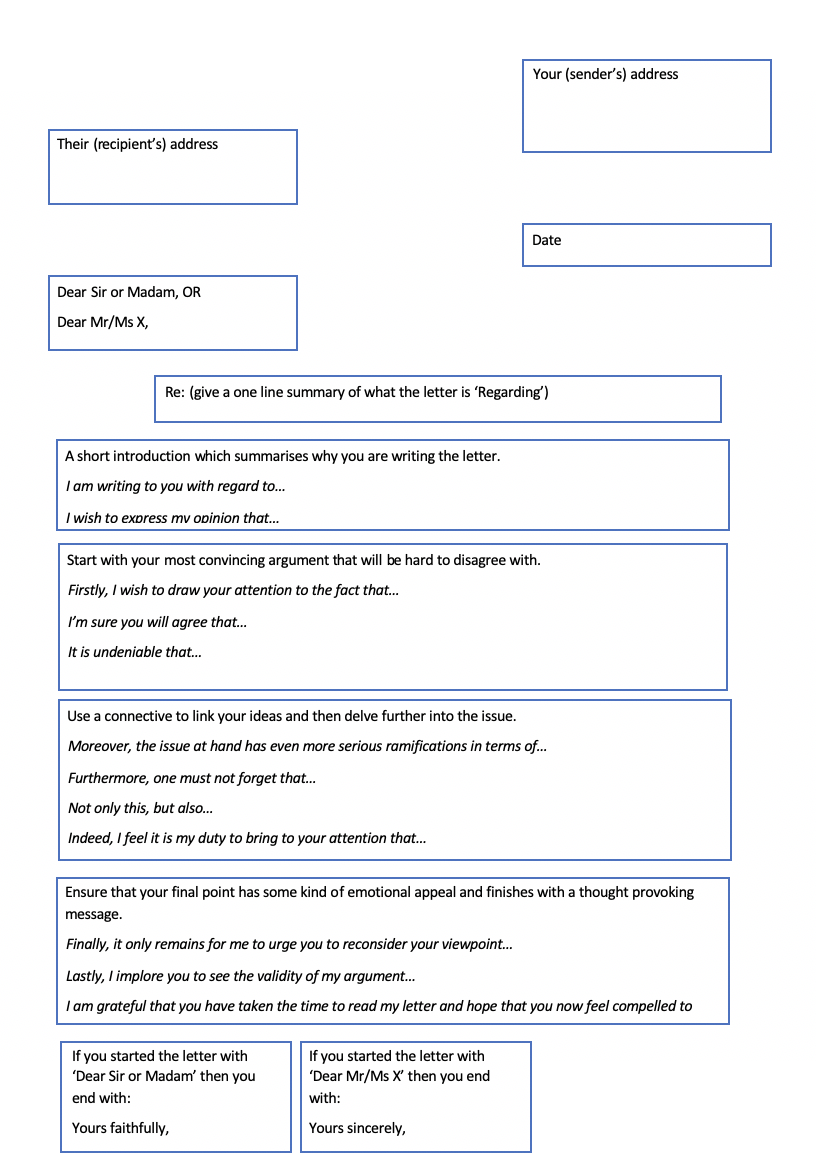How To Write A Formal Letter (11+ to GCSE)
From 11 plus through to GCSE, students frequently find non-fiction writing more challenging to demonstrate their full written ability and hit assessment objectives than fiction. This is often because they are less exposed to non-fiction in reading and in writing tasks. Examinations for school entrance at 11+ and 13+ frequently assess students’ ability to write and respond to non-fiction: speeches, letters, reports, diaries, so it is crucial to address this. Georgia, full-time English teacher at Ibstock Place and 1st Class English Oxford Graduate, leads students through the ins and outs of formal letter writing.
Three key factors to consider when writing a formal letter:
Purpose: you will usually be writing to persuade someone of something. How will you do this? You must include a range of rhetorical techniques and adapt your points to the ones which your audience will be most convinced by.
Audience: who are you writing to? This will affect your tone and the manner in which you try to persuade them.
The structure of your argument: how will you develop your ideas and link them together to make them convincing?
Crafting a persuasive argument in a formal letter
When writing to persuade, you must consider the content of your argument as well as the way in which you write it. Consider what is most likely to persuade the recipient of your letter to agree with your opinion. In exam questions you will often be asked to write to either your Head Teacher, a local MP or a newspaper. Clearly, different arguments will be needed for each of these recipients because they all have different priorities.
What would persuade a Head Teacher?
Assure them that this idea will unlock the pupils’ academic potential
Exemplify how your idea will benefit the wellbeing of pupils and staff
Argue that parents are likely to be in favour of your idea
Reassure them that the project will not be costly, or suggest ways in which it could be funded
Remind them that other schools in the area have similar initiatives
Maintain a polite, deferential tone
Back up your points with evidence, statistics, anecdotes and research.
What would persuade an MP?
Argue that this initiative will be popular with the majority of constituents
Exemplify how this initiative will have positive social, environmental and economic impacts
Reassure them that this initiative will benefit both the younger and elder generations
Remind them that it is their duty as an elected official to listen to your views
Suggest ways in which the initiative can be rolled out to minimise disruption and maximise popularity
Back up your points with evidence, statistics, anecdotes and research.
Maintain a polite but firm tone
What would persuade a newspaper editor?
Argue that the opinion they have expressed in their article was not representative and provide counter-arguments
Exemplify the social, economic and environmental ramifications of the argument
Remind the editor of the possible negative consequences that their article might have had on readers
Suggest that they should focus on informing people of the truth rather than catastrophising in order to sell copies
Back up your points with evidence, statistics, anecdotes and research.
Maintain a polite but firm tone
What to include in a formal letter:
When trying to come up with a range of ideas for your argument, you might consider the following angles:
Social
Mental health
Obesity
Social mobility
Crime
Vulnerable people e.g. the elderly
Housing
Environmental
Co2 emissions
Health impacts of pollution
Extinction of wildlife
Habitat destruction
Global warming
Litter
Economic
Funding
Benefits
Wages
Disposable income
Charity work
Austerity
How to write persuasively in a formal letter: tips and strategies
As well as making sure your ideas are persuasive you must also ensure that your language is persuasive. There are a range of rhetorical techniques you can use to make your writing more convincing. Make sure you use them accurately and judiciously rather than just for the sake of it though as it can weaken your argument if you overuse these techniques!
Rhetorical questions
These can be very effective when used correctly. Remember, the purpose of a rhetorical question is to make the reader think and reconsider their views.
AVOID: ‘You don’t want this, do you?’
Instead, try: ‘Is this the most effective use of our resources?’
Anecdotes
You need to give convincing examples that will really prove your point. Anecdotes should be significant and thought provoking.
AVOID: ‘My dad started exercising and it changed his life.’
Instead, try: ‘My father’s friend got very ill from heart disease. My dad was absolutely devastated and ran a marathon to raise money for charity. Not only did he change his own life, but his donations changed the lives of countless others.’
Emotive language
Consider the advertisements you see on television for children’s charities. Every word they use is crafted to pull at your heartstrings and convince you to donate money. Your language should be similarly persuasive; use a range of adjectives and adverbs to add emotion to your writing.
AVOID: ‘If you cut down the forest then the wildlife will die’
Instead, try: ‘By cruelly destroying the homes of these vulnerable critters you will be eradicating dozens of ecosystems and tearing families apart.’
Facts, figures and statistics
Use evidence to back up your arguments. Make sure they are relevant and realistic. It helps to state where you ‘got’ this information (although you are obviously making it up!)
AVOID: ‘99% of people think…’/ ‘3/4 people don’t like…’
Instead, try: ‘According to a recent survey by the NHS in 10 major hospitals, 85% of patients feel that…’
Repetition/ Anaphora
Subtle repetition can be effective but don’t overuse it. It can be effective to use an idea or phrase at the beginning and ending of a piece to emphasise it or to convey a message. For example, an opening of a speech could be ‘When I was young, I wanted to be a sheriff.’ And then end it with ‘Sadly, I’m no sheriff, but I am still dedicated to building a just society.’
Tricolon
Ascending tricolons can be emotive, motivational and persuasive. Make sure each ‘step’ is significant and will have an impact.
How to layout your formal letter
Looking for an English tutor to enhance your English writing technique?
Our team of English Language and Literature Oxbridge graduates, including alumni from the majority of top UK schools, host English tuition sessions for students approaching 11+, 13+, GCSE and A-Level/ IB, as well as general subject tuition.
Contact us, book a complimentary consultation and we will suggest a suitable English mentor based on the student’s specific requirements.
The Tuition Process
1) We suggest an Oxbridge graduate with a specialism in GCSE, A-Level or IB as a mentor and send their full CV for review. We will select a tutor with most experience of the examination board the student is following. We may suggest a range of tutors to choose from with slightly differing rates depending on qualifications and level of experience.
2) We typically suggest beginning with a 1.5 hour informal assessment/ preliminary session, where the tutor will get to know the student and assess their current performance level and identify strengths and weaknesses. Following this, we issue a report with feedback, make sure you are happy with the tutor, and structure a plan for future sessions.
3) Regular sessions: Following the first session, the tutor/s will curate a plan for further sessions, working out a good split between papers/ texts/topics to cover. They will also ensure the student has the tools they need with regards to exam technique/ understanding how to tick the boxes of mark schemes. All of our tutors are Oxbridge-educated and highly passionate about their subjects, so should hopefully mentor and inspire the student too! We send reports after every session detailing feedback and students/ parents & guardians liaise directly with the tutor to arrange sessions around their schedule.
Sessions from £70/h + VAT.





